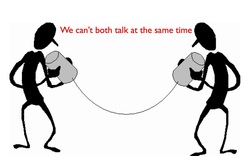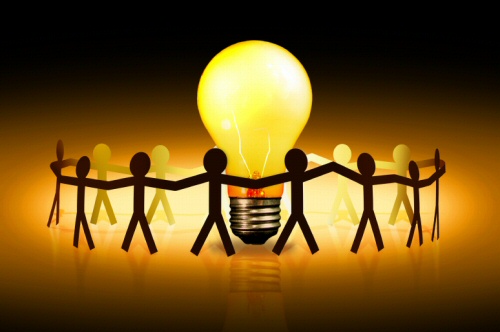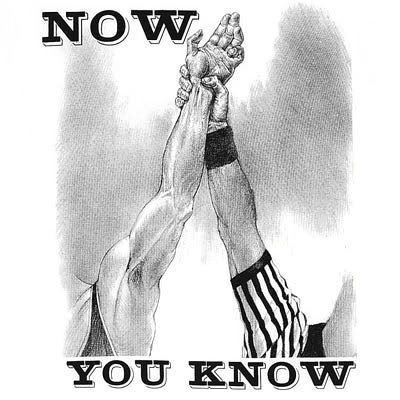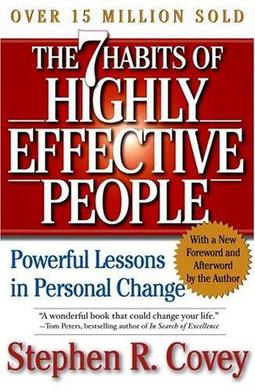The 7 Habits of Highly Effective People
Habits 1: Be Proactive
"Habits is the key to unlocking all the other habits and that's why it comes first. It says , "I am the captain of my life . I can choose my attitude . I'm responsible for my own happiness or unhappiness . I am in the driver's seat of my density , not just a passenger."
Posted by Mr. Haymore
Habit 1: Be Proactive is about taking responsibility for your life. You can't
keep blaming everything on your parents or grandparents. Proactive people
recognize that they are "response-able." They don't blame genetics,
circumstances, conditions, or conditioning for their behavior. They know they
choose their behavior. Reactive people, on the other hand, are often affected
by their physical environment. They find external sources to blame for their
behavior. If the weather is good, they feel good. If it isn't, it affects their
attitude and performance, and they blame the weather. All of these external
forces act as stimuli that we respond to. Between the stimulus and the response
is your greatest power--you have the freedom to choose your response. One of the
most important things you choose is what you say. Your language is a good
indicator of how you see yourself. A proactive person uses proactive
language--I can, I will, I prefer, etc. A reactive person uses reactive
language--I can't, I have to, if only. Reactive people believe they are not
responsible for what they say and do--they have no choice.
Habit 2: Begin with the end in mind
"Control your own destiny or someone else will."(Jack Welch) "When you know where you intended to end up , you know where you are now."
Habit 2 is based on imagination--the ability to
envision in your mind what you cannot at present see with your eyes. It is
based on the principle that all things are created twice. There is a mental
(first) creation, and a physical (second) creation. The physical creation
follows the mental, just as a building follows a blueprint. If you don't make a
conscious effort to visualize who you are and what you want in life, then you
empower other people and circumstances to shape you and your life by default. It's
about connecting again with your own uniqueness and then defining the personal,
moral, and ethical guidelines within which you can most happily express and
fulfill yourself. Begin with the End in Mind means to begin each day, task, or
project with a clear vision of your desired direction and destination, and then
continue by flexing your proactive muscles to make things happen.
Habit 3: Put First Thing First
"Organize and execute around priorities."
Habit 3 is about life management as well–your
purpose, values, roles, and priorities. What are “first things?” First things
are those things you, personally, find of most worth. If you put first things
first, you are organizing and managing time and events according to the
personal priorities you established in Habit 2.”The instructors were saying “Look at all those
things that matter in your life – or that part of your life that is your work.
Major projects. That potentially paradigm-shifting research on earthquake
prediction. The restoration of 30 square miles of underwater habitat. The
buyout and tear down of floodplain housing in your city and the establishment of
a riverfront park. Writing that book. Learning that second language…
Habit 4:Think Win-Win Think Win-Win isn't about being nice, nor is it a
quick-fix technique. It is a character-based code for human interaction and
collaboration.
Most of us learn to base our self-worth on comparisons and competition. We
think about succeeding in terms of someone else failing--that is, if I win, you
lose; or if you win, I lose. Life becomes a zero-sum game. There is only so
much pie to go around, and if you get a big piece, there is less for me; it's
not fair, and I'm going to make sure you don't get anymore. We all play the
game, but how much fun is it really?
Win-win sees life as a cooperative arena, not a competitive one. Win-win is a
frame of mind and heart that constantly seeks mutual benefit in all human
interactions. Win-win means agreements or solutions are mutually beneficial and
satisfying. We both get to eat the pie, and it tastes pretty darn good!
Habit 5:Seek First to Understand, then to be understood
"Diagnose before you prescribe"
If you're like most people, you probably seek first
to be understood; you want to get your point across. And in doing so, you may
ignore the other person completely, pretend that you're listening, selectively
hear only certain parts of the conversation or attentively focus on only the
words being said, but miss the meaning entirely. So why does this happen?
Because most people listen with the intent to reply, not to understand. You
listen to yourself as you prepare in your mind what you are going to say, the
questions you are going to ask, etc. You filter everything you hear through
your life experiences, your frame of reference. You check what you hear against
your autobiography and see how it measures up. And consequently, you decide
prematurely what the other person means before he/she finishes communicating.
Do any of the following sound familiar?
"Oh, I know just how you feel. I felt the same way." "I had that
same thing happen to me." "Let me tell you what I did in a similar
situation."
 Habit 6: Synergize
Habit 6: Synergize
"The whole is greater than the sum of its parts
To put it simply, synergy means "two heads are
better than one." Synergize is the habit of creative cooperation. It is
teamwork, open-mindedness, and the adventure of finding new solutions to old
problems. But it doesn't just happen on its own. It's a process, and through
that process, people bring all their personal experience and expertise to the
table. Together, they can produce far better results that they could
individually. Synergy lets us discover jointly things we are much less likely
to discover by ourselves. It is the idea that the whole is greater than the sum
of the parts. One plus one equals three, or six, or sixty--you name it.
When people begin to interact together genuinely, and they're open to each
other's influence, they begin to gain new insight. The capability of inventing
new approaches is increased exponentially because of differences.

Habit 7: Sharpen the saw
The four Dimension of self-Renewal:Physical, Mental, Spiritual , social/emotional
As you renew yourself in each of the four areas, you create growth and change
in your life. Sharpen the Saw keeps you fresh so you can continue to practice
the other six habits. You increase your capacity to produce and handle the
challenges around you. Without this renewal, the body becomes weak, the mind
mechanical, the emotions raw, the spirit insensitive, and the person selfish.
Not a pretty picture, is it?
Feeling good doesn't just happen. Living a life in balance means taking the
necessary time to renew yourself. It's all up to you. You can renew yourself
through relaxation. Or you can totally burn yourself out by overdoing
everything. You can pamper yourself mentally and spiritually. Or you can go
through life oblivious to your well-being. You can experience vibrant energy.
Or you can procrastinate and miss out on the benefits of good health and
exercise. You can revitalize yourself and face a new day in peace and harmony.
Or you can wake up in the morning full of apathy because your get-up-and-go has
got-up-and-gone. Just remember that every day provides a new opportunity for
renewal--a new opportunity to recharge yourself
Reflection:Learning just 7 habits to become more effective
seemed like just the quick fix I was looking for back then. I figured I could
learn a few more habits, after all the habits I was trying to break I don’t
remember trying to learn in the first place. When I completed reading his
book, I recall feeling a new found sense of order in how to approach life and
work.
I have followed Stephen Covey work over the years
and have implemented his teaching in how I approach leading an organization and
the consulting services we provide to universities evaluating their campus
housing programs. I decided after reading of Stephen Covey death I would read
his book again and see if there was something I missed the first time or if age
and experience allowed a different lesson to come through.



